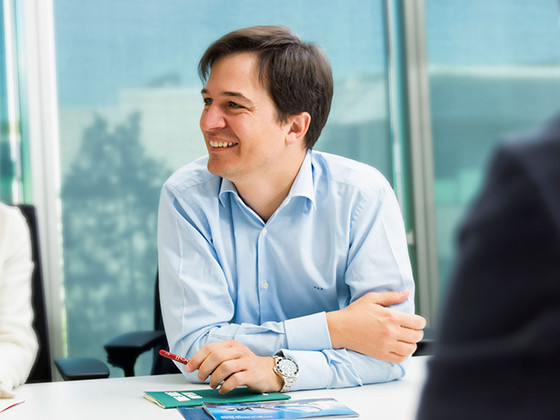Start
Marzo 2025
Mode:
Online
Duration:
Leer más abajo
Price:
Leer más abajo


Do you miss having deep conversations about the most important topics in humanity?
We live in the culture of sarcasm and easy tweet, and we're drowning between data and information storms. Would you like to know what the most important thinkers in history have thought about the human condition, culture, and society? If you're exhausted from all the current controversy and looking for a refuge where you can reconnect with the titans of thought, this is the place for you.
For whom are these seminars?
These seminars are designed for people who already work or whose commitments don't leave much time to spare. This program is aimed at those who want to read and approach the great works surrounded by people with similar interests, but with the help of a professor well-versed in the subject matter. No prior studies or special training are required. All you need is an interest in the topic – the rest is taken care of by the professor.
Know more about this program
Welcome to one After work Virtual What will be worth it. We meet for a weekly session, approximately an hour or as long as the book reading takes. Normally, you'll have to read one or two chapters per week per session. However, we're aware that there are weeks and personal schedules that might make it complicated; no problem. You can attend the class just to listen.
During the session, the professor will have a masterful intervention and then an open dialogue with the participants will take place. The sessions are recorded, in case any student misses a session. Each seminar is centered around a different book, with limited seating to ensure a manageable atmosphere and enable genuine conversations to occur.
Prepare to challenge your preconceived notions, enrich your knowledge and nourish your soul with the beauty and depth of Western civilization's major works.
¿Cómo lidiar con los desafíos de nuestra era, como la polarización, la pérdida de confianza en las instituciones o el equilibrio entre libertad e igualdad? En este curso exploraremos las ideas más transformadoras de Tocqueville a través de varias lecturas clave. Cada sesión no solo te permitirá comprender el contexto histórico y político del siglo XIX, sino que también te ayudará a reflexionar sobre los retos que enfrentan las democracias contemporáneas.
Te invitamos a sumarte a esta experiencia única, donde la historia, la filosofía y la política se encuentran para darnos prácticas claves y profundas sobre el mundo en el que vivimos.
¡Nos vemos en el curso!
Ser y tiempo (1927) es, sin duda, uno de los grandes libros de la historia de la filosofía occidental. El secreto de Ser y tiempo y de su constante presencia cultural y filosófica radica en su estimulante replanteamiento de la pregunta filosófica fundamental: la pregunta por el sentido del ser y, por extensión, el sentido de nuestra propia existencia.
Este curso brinda un itinerario de lectura que permita a los lectores orientarse por los territorios filosóficos explorados por Heidegger. Para ello, ofreceremos a los interesados en este curso una brújula y un mapa que les permitan identificar los temas abordados en esta obra y, sobre todo, que les ayude a comprender el peculiar lenguaje heideggeriano.
¡Nos vemos en el curso!
¿Es posible entender la política sin una visión integral del mundo? Para Aristóteles, no. En este curso exploraremos su Política, no como un tratado aislado, sino como parte de su vasto pensamiento filosófico, en el que disciplinas como la ética, la retórica o la metafísica se entrelazan en la búsqueda del conocimiento.
Sumérgete en la obra del Filósofo por excelencia y descubre por qué su legado sigue moldeando nuestra comprensión del derecho, la política y la sociedad.
¡Nos vemos en el curso!
Las metamorfosis de Ovidio: Un fascinante viaje a la mitología grecorromana
The 29 de mayo de 2025 the 31 de julio de 2025. 10 sesiones.
Schedules Jueves de 19:00h a 20:20h (GMT +0, Canarias) / 20:00-21:20 h (GMT +1, Madrid)
Mode: Online
Price: 140€ *
Provided by: Mateo Rodríguez-Braun
* Para ofrecer la mejor experiencia educativa, utilizamos la plataforma de e-learning Canvas. Si ya eres alumno con acceso a la plataforma, no necesitarás una licencia. Si por el contrario no estás matriculado en ningún programa que utilice esta plataforma, tendrás que abonar el coste de la licencia (30€), la cual será válida durante un año para todos los cursos que hagas con nosotros.
Cursos pasados
Renaissance Political Thought: Machiavelli and Guicciardini
Provided by: José Ruiz Vicioso
Why do we associate Machiavelli with concepts like cunning, virtue or fortune? Why his work The Prince has it influenced so much? and the Memories of GuicciardiniWhy haven't they stopped being re-published and read as a guide for politicians? It's often repeated that modern politics was born in Renaissance Florence. In this seminar, we'll try to find out why, through the reading of two great thinkers from the time.
The Wealth of NationsAdam Smith
Provided by: Daniel Fernandez
It might be a good idea to start learning physics by reading an introductory textbook on physics.. And for learning economics, wouldn't it be a good idea to do exactly the same thing? The answer to this question is: "it depends." It depends on how much you really want to ask yourself complicated questions and try to approximate not one but several answers. Introductory textbooks calm the reader's intellectual curiosity by providing almost always straightforward answers to problems that are often too complex. As Henry L. Mencken would say, "for every complex problem there is a simple, clear, and wrong solution." Do you want a good answer or do you want a good question? That's the key question of this seminar. The reading of The Wealth of Nationswritten by Adam Smith in 1776, is probably the best starting point for a journey and a poor place to end it. Smith is known, with some reason, as the first economist in history. But the story of economics doesn't end with Smith.
What our former students say

Exploring "La República" by Plato was a revelatory experience for me. The expert guidance of Professor Will Ogilvie and the course format allowed me to gain a deep understanding of the work, something I wouldn't have achieved on my own. Additionally, the welcoming atmosphere and dynamic that encouraged free expression of opinions and ideas contributed to more comprehensive learning and the development of critical thinking.
Enrique Lominchar Galaso Spain
I participated in the project Conversaciones sobre Grandes Libros with Will. Thanks to his great knowledge and during ten instructive sessions, he guided us through Plato's The Republic, helping us unravel its main teachings.
The initial chat with the keys to each chapter and their interpretation is very inspiring, and the subsequent conversation with other classmates opens your eyes to many different viewpoints that make you reflect and enrich what you take away from the reading.
Without a doubt, with Will there wouldn't have been able to complete the journey and get as much juice out of the book. I highly recommend his program 100% and, of course, I'm already looking forward to the next one.
Alberto Campillo Bernal Spain
Studying philosophy shouldn't be complicated at all and this course has proven it to me! With "The Republic" by Plato, one of the most influential and significant works, I've been able to reflect on important ideas related to politics, justice, ethics, women, and other social issues that are still alive and shaping our lives and communities.
This course has provided me with a huge amount of knowledge and methodologies for tackling texts that we sometimes consider complex. Despite this, in a participatory way, we've managed to dialogue with the author, the professor, among students, and draw contextualized conclusions and new questions about what we're doing as modern societies and where we're headed. The experience is highly recommended! I'm very grateful to Professor Will Ogilvie for facilitating these valuable learning spaces!
Lucía Muñoz Argueta Guatemala
.h educational
model:
The life of society will be part of your experience in . h
You will enjoy a variety of extracurricular activities such as in-person visits, reading groups and film forums, among others, to enrich your university experience. We believe that social interaction outside of academic activity is essential for establishing connections, having fun, and growing as people. Social life is a fundamental part of a full and successful university life and . h You will be able to be part of new experiences with students and teachers.





